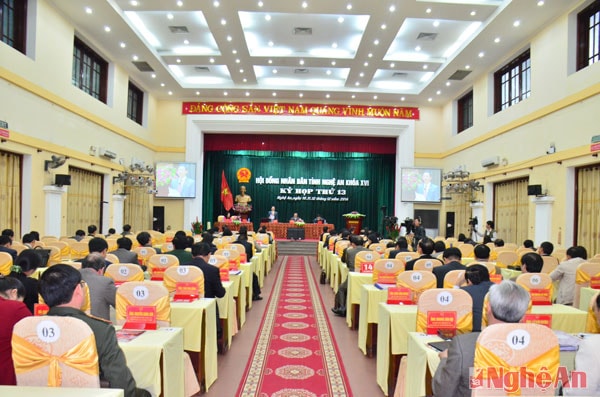Voters reflect pressing issues via hotline
(Baonghean.vn)- By noon on December 12, there were a total of 42 opinions from voters reflected through the hotline of the 13th session of the 16th Provincial People's Council. The opinions focused on issues of the Labor - Invalids and Social Affairs sector, the health sector and complaints and denunciations about a number of other related issues.
Among the opinions received through the hotline, there are 11 opinions from voters related to the Department of Labor - Invalids and Social Affairs with contents such as resolving the regime for war invalids and people with meritorious services, resolving the issue of medals; some procedures on labor export; the assessment of poor households in some places is not transparent, learning about some policy issues for poor households...
Voters' opinions were also questioned by People's Council delegates to Mr. Nguyen Bang Toan, Director of the Department of Labor, War Invalids and Social Affairs on the morning of December 12.
 |
| By noon on December 12, there were 42 opinions sent via hotline to the 13th session of the 16th Provincial People's Council. |
Regarding the policy on poor households, Mr. Nguyen Dang Duong, Deputy Director of the Department of Labor, War Invalids and Social Affairs of the province, said that there is a situation of favoritism and unfairness in the process of evaluating poor households in different places. Mr. Duong said that the Department of Labor, War Invalids and Social Affairs has issued many directives and established inspection teams, but it is not possible to inspect all hamlets and communes, but only randomly, so it is not possible to detect all violations in localities. The problem here is that the responsibility of grassroots officials is not close, not impartial, and somewhat respectful to each other, with the mentality of sharing benefits equally in the process of evaluating poor households. Currently, the Chairman of the Commune People's Committee is the person who signs the decision on poor households for the people and this is also the person who clearly knows which households deserve to be poor, have escaped poverty but still allow violations to occur.
Mr. Duong suggested that in the coming time, it is necessary to continue to strengthen propaganda to raise people's awareness in actively escaping poverty, finding a sustainable way to escape poverty, and not to expect or rely on the state. Grassroots officials and local social organizations must further enhance their role, be more decisive and impartial in the process of implementing policies and guidelines, including the issue of assessing poor households. In cases of violations, it is necessary to resolutely and strictly handle them. People's Council delegates need to strengthen supervision, enhance their role in detecting and handling problems arising at the grassroots, including policies for poor households. If grassroots officials do well and fairly, district and town leaders strengthen inspection and supervision, and People's Council delegates strengthen supervision, the above situation will certainly decrease.
There are 12 opinions related to the health sector, including policies for health workers, the policy of dissolving regional polyclinics, and the proposal to publicize referrals in medical treatment; the division of medical examination and treatment is not clear, especially the initial place for medical examination and treatment is the commune health stations while the medical staff here cannot meet the people's needs...
In addition, many voters' opinions reflected issues related to staff recruitment, social security and order, and denunciations and complaints about specific issues.
On the same day, 8 citizens came directly to the meeting's reception room to express their wishes to the Provincial People's Council delegates.
All voters' opinions via the hotline have been compiled and transferred directly to delegates and relevant authorities for prompt resolution and response to citizens.
Nguyen Khoa
